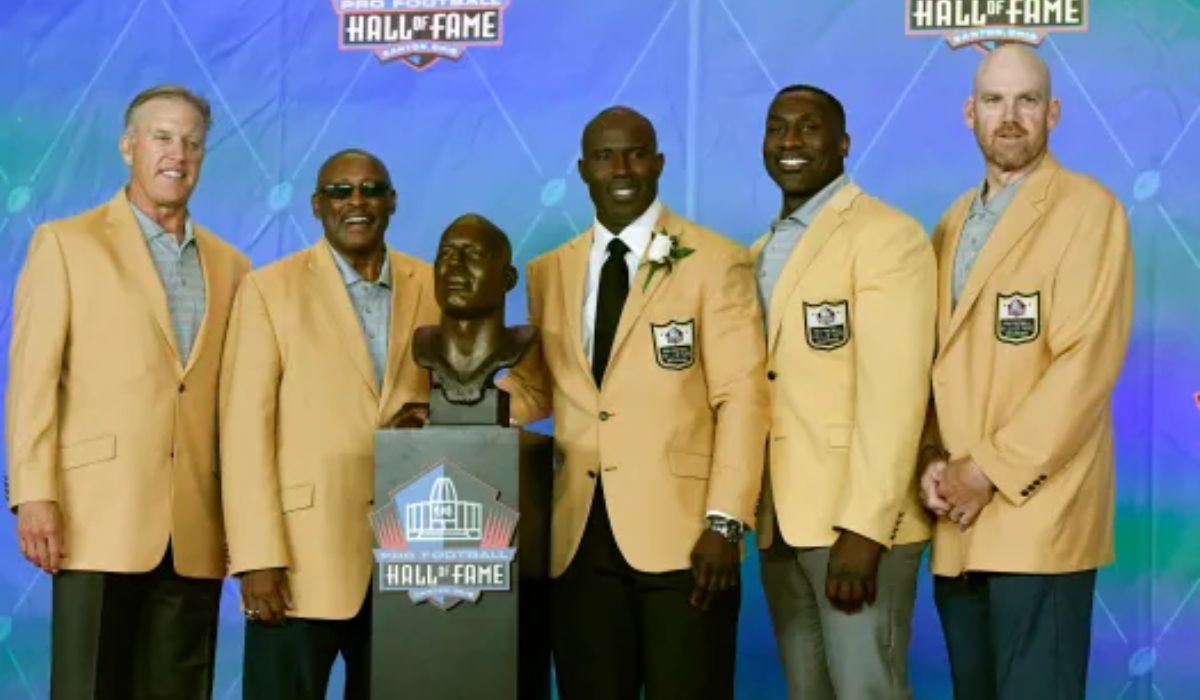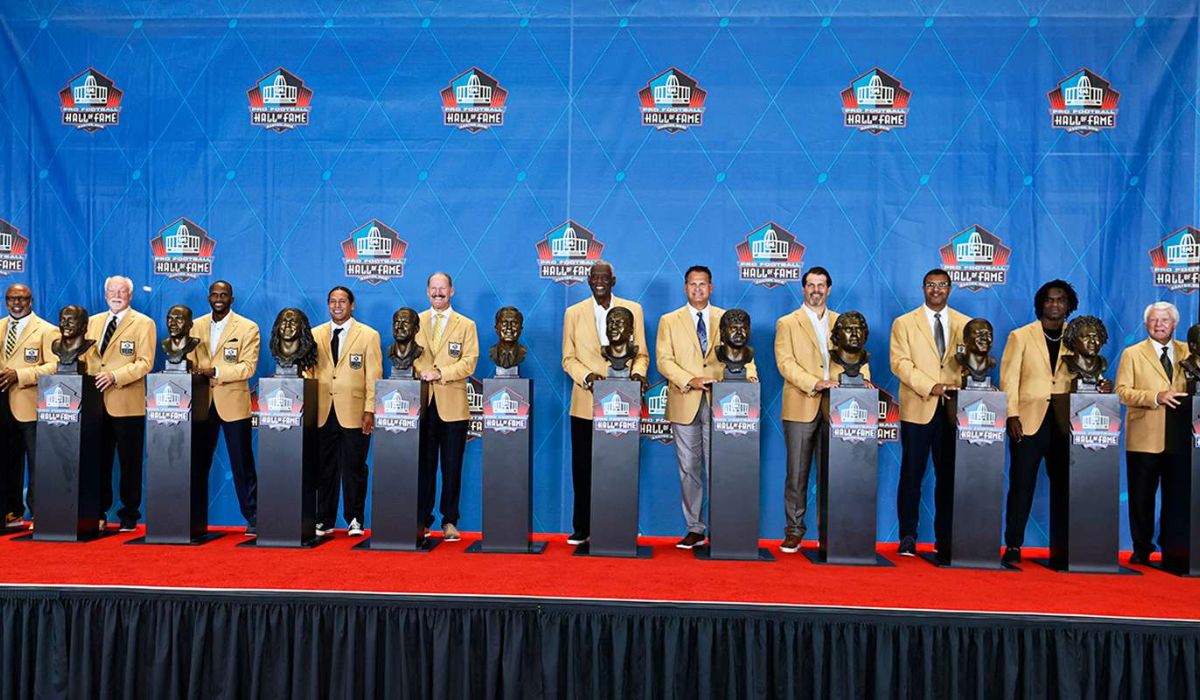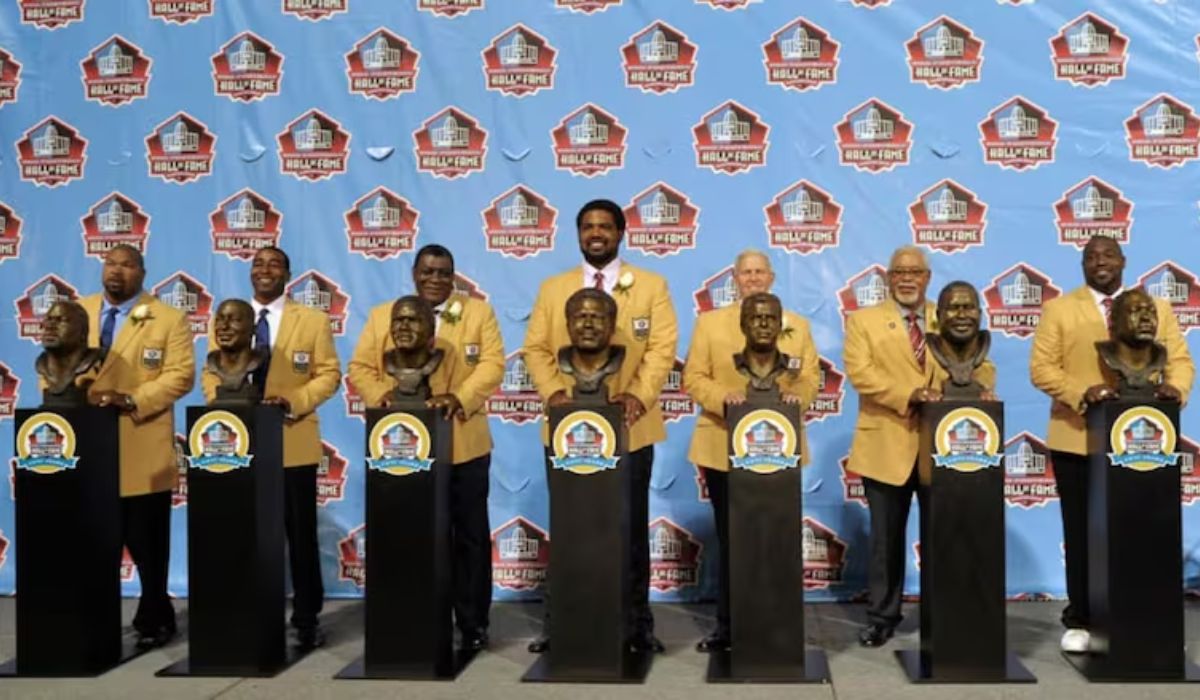Sterling Sharpe, a name that resonates with football fans, is often remembered as one of the most dynamic wide receivers to ever play the game. His career, though unfortunately cut short, left an indelible mark on the NFL. Yet, there remains a significant question: why hasn’t Sharpe been inducted into the Pro Football Hall of Fame? In this article, we’ll take a closer look at his remarkable career, the Hall of Fame debate, and why Sterling Sharpe deserves to be recognized as one of football’s all-time greats.
The Career of Sterling Sharpe

Sterling Sharpe’s journey to becoming one of the most respected wide receivers in NFL history started at the University of South Carolina, where he quickly made a name for himself. After being selected by the Green Bay Packers in the first round of the 1988 NFL Draft, Sharpe became an integral part of the team’s offense, despite facing immense pressure to perform.
Sharpe’s speed, quickness, and ability to make incredible catches set him apart from many of his contemporaries. Playing alongside the legendary Brett Favre, Sharpe’s chemistry with the quarterback quickly blossomed into one of the most formidable duos in football.
Sterling Sharpe’s Stats and Achievements
Sterling Sharpe’s career stats are nothing short of impressive. Over the course of just seven seasons, Sharpe racked up:
- 595 receptions
- 8,134 receiving yards
- 65 touchdowns
Though his career was cut short due to a neck injury in 1994, Sharpe’s numbers rank among the best for wide receivers in NFL history, especially when you consider the brevity of his playing time.
Moreover, Sharpe’s dominance on the field wasn’t just in his statistics. In 1992, he led the NFL in both receptions (108) and touchdowns (18), becoming one of the most feared wide receivers in the league. His consistency, clutch performances, and physicality made him one of the most respected players in the league during his prime.
The Hall of Fame Debate: Why Not Yet?

The biggest question surrounding Sterling Sharpe is why he hasn’t been inducted into the Pro Football Hall of Fame. Despite his remarkable career, Sharpe’s candidacy has not been met with the same enthusiasm as other wide receivers of his era.
Some critics argue that his career length, while impressive in the time it spanned, is too short compared to other Hall of Fame wide receivers. However, many believe that this misses the bigger picture: Sharpe’s dominance during those seven seasons was unparalleled. His ability to perform at a Hall of Fame level in such a short amount of time raises the question of what more he could have achieved had his career not been cut short.
Sterling Sharpe’s Impact on the Green Bay Packers
Sharpe’s influence on the Packers cannot be overstated. During his time in Green Bay, Sharpe was a key part of the team’s offense, and his ability to make crucial catches in critical moments helped propel the Packers to success. While the Packers didn’t win any championships during Sharpe’s tenure, his performances played a huge role in shaping the franchise’s future.
Sharpe’s partnership with Brett Favre became the foundation of the Packers’ offensive success throughout the early 1990s. Favre, one of the NFL’s most iconic quarterbacks, often turned to Sharpe for key plays, and the two developed a connection that is still remembered by fans today.
Comparing Sterling Sharpe to Hall of Fame Wide
Receivers

When comparing Sterling Sharpe to other Hall of Fame wide receivers, it’s clear that his impact on the game was substantial. While his career was cut short, his stats and ability to change the course of games make him an easy comparison to wide receivers like Art Monk, Andre Reed, and James Lofton.
For instance, Monk played 16 seasons in the NFL, yet Sharpe’s per-season averages stack up favorably when compared to Monk’s career. Similarly, Reed played for 16 seasons and had over 1,100 receptions, yet Sharpe’s impact during his seven years on the field was every bit as significant.
Sharpe’s name deserves to be mentioned in the same breath as these legends, and many believe it’s only a matter of time before the Hall of Fame recognizes his greatness.
The Untold Story: Why Sharpe’s Career Was Cut Short
Sterling Sharpe’s career ended abruptly in 1994 due to a neck injury. His doctors advised him to retire to avoid the risk of permanent paralysis, a decision that would cut short a promising career. Had Sharpe played for several more years, it’s likely that his stats would have placed him among the all-time greats in NFL history.
The impact of his injury is still felt by fans who wonder what Sharpe could have achieved with more seasons. His decision to retire early was an emotional one, but it ultimately preserved his health and allowed him to have a successful career post-football.
Sterling Sharpe’s Influence Beyond Football
Sterling Sharpe’s legacy isn’t just confined to his playing days. After his retirement, he transitioned to a career in broadcasting and media. His charisma, sharp analysis, and passion for the game have made him a respected figure in the sports media world.
Beyond his career, Sharpe’s involvement in the community and his advocacy for various charitable causes also stand as a testament to his character and influence. He remains a beloved figure among Packers fans, and his contributions to the sport go beyond what he accomplished on the field.
What Would Sterling Sharpe’s Hall of Fame Induction Mean?
Inducting Sterling Sharpe into the Hall of Fame would be a fitting tribute to a player who was ahead of his time. It would validate his incredible achievements despite the shortened career and show that the Hall of Fame recognizes not only longevity but also greatness in the time a player spends on the field.
For Sharpe, an induction would be the culmination of years of hard work and dedication to the game of football. It would also serve as a reminder to fans and players alike that greatness can shine brightly in a short period.
The Support for Sterling Sharpe’s Hall of Fame Candidacy
While some may argue that Sharpe’s career length works against his Hall of Fame bid, there is a growing chorus of voices supporting his inclusion. NFL legends, former teammates, and analysts continue to advocate for Sharpe, recognizing the skill and impact he brought to the game in a limited time.
Additionally, many fans passionately argue that Sterling Sharpe’s legacy is deserving of the Hall of Fame, citing his dominance as one of the best wide receivers during his prime years.
The Case for the Hall of Fame: Stats vs. Legacy
The Hall of Fame voting process often hinges on a combination of a player’s statistics and their overall legacy in the game. While Sterling Sharpe’s numbers may not match those of some players with longer careers, his legacy is undeniable. His ability to dominate the field in a short period, his connection with Brett Favre, and his influence on the Packers’ offense make him a worthy candidate for the Hall of Fame.
Sterling Sharpe’s Lasting Influence on the NFL
Sterling Sharpe’s impact on the NFL is still felt today, especially by younger wide receivers who admire his tenacity, hands, and playmaking ability. Many modern receivers look up to Sharpe as one of the pioneers of the position, and his approach to the game set the stage for future generations.
Sharpe’s name will forever be tied to the Packers’ great offensive eras and the development of the wide receiver position in the NFL.
The Hall of Fame and the Politics of Voting
Like many Hall of Fame debates, the process of selecting players is often influenced by factors outside of stats and performance. The political side of Hall of Fame voting has long been a topic of discussion, with some players being overlooked or waiting years for induction. Sterling Sharpe’s case is one such example, where his greatness might be overshadowed by factors like career length and competition from other wide receivers.
Sterling Sharpe: A Hall of Fame Player in Every Way
In every sense, Sterling Sharpe embodies the qualities of a Hall of Fame player. His talent, work ethic, and passion for the game made him one of the most dangerous wide receivers of his time. Though his career was brief, the legacy he left behind is everlasting, and there is little doubt that Sharpe is deserving of Hall of Fame recognition.
What Fans Say About Sterling Sharpe and the Hall of Fame
Fans are not only vocal in supporting Sterling Sharpe’s Hall of Fame induction—they are passionate. Many argue that he should have been inducted long ago, citing his influence on the Packers, his performance in critical moments, and his status as one of the best wide receivers in history.
Conclusion: Sterling Sharpe’s Place in Football History
Sterling Sharpe’s legacy is cemented in the hearts of football fans around the world. His Hall of Fame induction would be the final piece in recognizing his greatness and contributions to the sport. Whether you are a Packers fan or simply a lover of the game, it’s clear that Sterling Sharpe belongs in the Hall of Fame.
FAQs
1. Why is Sterling Sharpe not in the Hall of Fame yet?
Despite his remarkable stats and influence on the game, Sharpe’s career length is often cited as the primary reason for his exclusion, although his dominance during his career is undeniable.
2. How long did Sterling Sharpe play in the NFL?
Sterling Sharpe played for seven seasons with the Green Bay Packers, from 1988 to 1994, before his career was cut short due to a neck injury.
3. What are Sterling Sharpe’s career statistics?
Sharpe finished his career with 595 receptions, 8,134 yards, and 65 touchdowns.
4. How did Sterling Sharpe impact the Green Bay Packers?
Sharpe was a key contributor to the Packers’ offense during the early 1990s, developing a strong connection with quarterback Brett Favre.
5. What is the case for Sterling Sharpe’s Hall of Fame induction?
Sharpe’s exceptional talent, his dominance during his prime, and his influence on the wide receiver position make him a deserving candidate for the Hall of Fame, despite his shorter career.
For More Visit, rankshort
